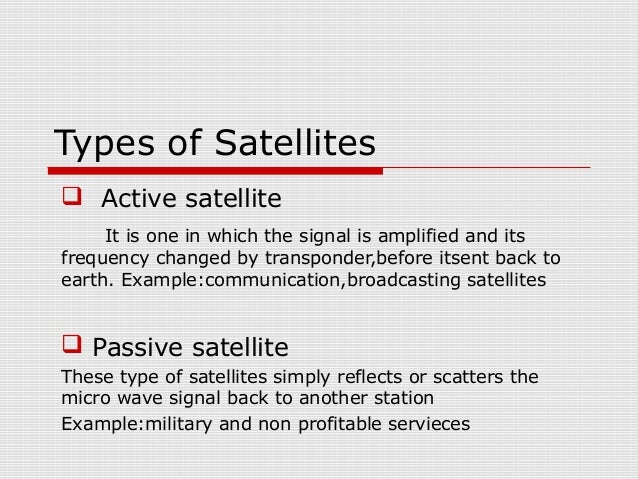Compare Active And Passive Satellite
Retirement savers can put the good points of both systems to work with core-satellite. Passive Investment Management. What are active and passive. In active satellite received the function of the energy band toward it by the ground transmitter system and the received.
Active And Passive Questions

In every great debate, there’s a middle ground, and often it’s home to a good compromise. SEE ALSO: Unfortunately, when the believers on either side are positive they’re right, that midway point is roundly and routinely ignored.
And the dispute rages on. The two sides of the active vs.

Passive portfolio-management feud aren’t exactly the Hatfields and McCoys, but they do seem unwilling to give an inch when discussing which is better for investors. It’s been a hot issue in the financial industry for years now, and appears to be an increasingly popular TV and radio topic. My clients ask me about the differences all the time, and they want to know which is better. I tell them I can’t get decisively behind one side or the other. Pros and cons of active and passive investing With an actively managed portfolio, a manager tries to outperform a given benchmark index (such as the S&P 500) by watching market trends, changes in the economy, political maneuverings, etc., to decide when to buy and sell investments. Passive portfolio management involves matching a specific index’s benchmark performance in order to generate the same return.

There’s no attempt to pick and choose — it’s an all-in approach. At first glance, it seems the active path would be the hands-down winner with investors. Who doesn’t want to think there’s somebody out there carefully tending to their precious nest egg — managing risk and adding value by making all the right moves when necessary? The problem, of course, is all that extra effort — watching, researching, frequent trading — generates more fees. The fund manager has to make more money just to cover those costs — and then make even more to outperform the comparable index fund. Those trades also can trigger capital gains that will end up going on your tax return even if you don’t actually see the money. A better approach: Core-satellite investing This is where the middle ground, the compromise, comes in — what is often referred to as core-satellite investing.
Active And Passive Exercises
This hybrid method of portfolio construction is designed to minimize your exposure to costs, market volatility and potential tax consequences, but it also offers an opportunity to outperform the market. See Also: The majority, or “core,” of the portfolio is made up of cost-efficient passive investments that track a major market index. The “satellites” are positions added in the form of actively managed investments that have the potential to boost returns and lower risk by further diversifying your holdings. In uncertain times like these — with the Fed penciling in more interest rates for this year, a record-setting bull market that has to end sometime, a new administration that has Washington, D.C., reeling, and the threat of terrorism around the world — this is an approach I can get behind. There’s no need to think of this as an either/or argument. Investors can benefit greatly by combining both management methods. Talk to your adviser about how core-satellite investing might give you some added flexibility while still working within the risk parameters of your portfolio.
See Also: Kim Franke-Folstad contributed to this article. Dan Webster is a Registered Financial Consultant, insurance professional and founder of South Carolina-based, a boutique investment firm. He is a member of the International Association of Registered Financial Consultants and the Financial Planning Association. In 2011, he was chosen as a Five Star Wealth Manager, and in 2014, Fusion Capital was featured in The Wall Street Journal as a Five Star Wealth Manager.
Compare Active And Passive Immunity
The Five Star Wealth Manager award, administered by Crescendo Business Services, LLC (dba Five Star Professional), is based on 10 objective criteria. The Five Star award does not evaluate quality of services provided to clients and is not indicative of the wealth manager's future performance. Wealth managers may or may not use discretion in their practice and therefore may not manage their client's assets. The inclusion of a wealth manager on the Five Star Wealth Manager list should not be construed as an endorsement of the wealth manager by Five Star Professional or Kiplinger.
Working with a Five Star Wealth Manager or any wealth manager is no guarantee as to future investment success. Comments are suppressed in compliance with industry guidelines.
This article was written by and presents the views of our contributing adviser, not the Kiplinger editorial staff. You can check adviser records with the or with.